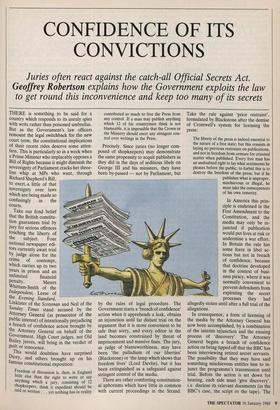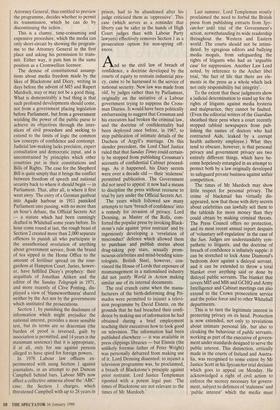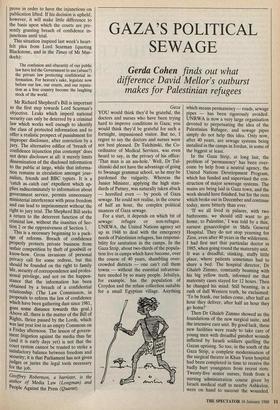CONFIDENCE OF ITS CONVICTIONS
Juries often react against the catch-all Official Secrets Act.
Geoffrey Robertson explains how the Government exploits the law
to get round this inconvenience and keep too many of its secrets
THERE is something to be said for a country which responds to its unruly spies with writs rather than poisoned umbrellas.
But as the Government's law officers remount the legal switchback for the new court term, the constitutional implications of their recent rides deserve some atten- tion. This is particularly so in a week when Take our fond belief that the British constitu- tion guarantees trial by Jury for serious offences touching the liberty of the subject. Four national newspaper edi- tors currently await trial by judge alone for the crime of contempt, Which carries up to two years in prison and an unlimited financial Penalty. Messrs Whittam-Smith of the Independent, Leese of the Evening Standard, Linklater of the Scotsman and Neil of the Sunday Times stand accused by the Attorney General (as prosecutor of the Public interest) of intentionally prejudicing a breach of confidence action brought by the Attorney General on behalf of the Government. High Court judges, not Old Bailey jurors, will bring in the verdict of guilt or innocence.
This would doubtless have surprised Dicey, and others brought up on his famous constitutional exposition:
Freedom of discussion is, then, in England little else than the right to write or say anything which a jury, consisting of 12 Shopkeepers, think it expedient should be said or written . . . yet nothing has in reality contributed so much to free the Press from any control. If a man may publish anything which 12 of his countrymen think is not blameable, it is impossible that the Crown or the Ministry should exert any stringent con- trol over writings in the Press.
Precisely. Since juries (no longer com- posed of shopkeepers) may demonstrate the same propensity to acquit publishers as they did in the days of seditious libels on George III and his ministers, they have been by-passed — not by Parliament, but by the rules of legal procedure. The Government starts a 'breach of confidence' action when it apprehends a leak, obtains an injunction until far distant trial on the argument that it is more convenient to be safe than sorry, and every editor in the land becomes constrained by threat of imprisonment and massive fines. The jury, as judge of blameworthiness, may have been 'the palladium of our liberties' (Blackstone) or 'the lamp which shows that freedom lives' (Lord Devlin), but it has been extinguished as a safeguard against stringent control of the media.
There are other comforting constitution- al aphorisms which have little in common with current proceedings in the Strand. Take the rule against 'prior restraint', formulated by Blackstone after the demise of Cromwell's system for licensing the press:
The liberty of the press is indeed essential to the nature of a free state; but this consists in laying no previous restraints on publications, and not in freedom from censure for criminal matter when published. Every free man has an undoubted right to lay what sentiments he pleases before the public; to forbid this is to destroy the freedom of the press; but if he publishes what is improper, mischievous or illegal, he must take the consequences of his own temerity.
In America this prin- ciple is enshrined in the First Amendment to the Constitution, and the media may only be in- juncted if publication would put lives at risk or undermine a war effort.
In Britain the rule has some force in libel ac- tions but not in breach of confidence, because that doctrine developed in the context of busi- ness piracy, where it was normally convenient to prevent defendants from exploiting the secret processes they had allegedly stolen until after a full trial of the allegations.
In consequence, a form of licensing of the media by the Attorney General has now been accomplished, by a combination of the interim injunction and the ensuing process of 'discovery'. The Attorney General begins a breach of confidence action on being tipped off that the BBC has been interviewing retired secret servants. The possibility that they may have said something mischievous entitles him to in- junct the programme's transmission until trial. Before the action is set down for hearing, each side must 'give discovery', i.e. disclose its relevant documents (in the BBC's case, the script or the tape). The Attorney General, thus entitled to preview the programme, decides whether to permit its transmission, which he can do by discontinuing the action.
This is a clumsy, time-consuming and expensive procedure, which the media can only short-circuit by showing the program- me to the Attorney General in the first place and asking his permission to trans- mit. Either way, it puts him in the same position as a Cromwellian licensor.
The demise of constitutional assump- tions about media freedom made by the likes of Blackstone and Dicey, writing in days before the advent of MI5 and Rupert Murdoch, may or may not be a good thing. What is demonstrably a bad thing is that such profound developments should come, not from a government placing legislation before Parliament, but from a government wielding the power of the public purse to achieve its objectives through the inter- stices of civil procedure and seeking to extend to the limits of logic the common law concepts of confidence and contempt. Judicial law-making lacks precision, expert consultation and democratic input, and is unconstrained by principles which other countries put in their constitutions and Bills of Rights. The case for the Shepherd Bill is quite simply that it brings the conflict between freedom of speech and national security back to where it should begin — in Parliament. That, after all, is where it first went awry. The entry of a German gunboat into Agadir harbour in 1911 panicked Parliament into passing, with no more than an hour's debate, the Official Secrets Act — a statute which had been cunningly drafted in Whitehall some years before. Its hour come round at last, the rough beast of Section 2 created more than 2,000 separate offences to punish all who participate in the unauthorised revelation of anything about government service, from the brand of tea sipped in the Home Office to the amount of fertiliser spread on the rose- gardens at Hampton Court. Juries, howev- er, have fulfilled Dicey's prophecy: their acquittals of Jonathan Aitken and the editor of the Sunday Telegraph in 1971, and more recently of Clive Ponting, dis- played a view of 'blameworthiness' shared neither by the Act nor by the governments which instituted the prosecutions.
Section 1, by punishing the disclosure of information which might prejudice the national interest, provides a more sensible test, but its terms are so draconian (the burden of proof is reversed, guilt by association is permitted, and 14 years is the maximum sentence) that it is appropriate, if at all, only for use against persons alleged to have spied for foreign powers.
In 1978 Labour law officers ex- perimented with using Section 1 against journalists, in an attempt to put Duncan Campbell behind bars. Labour MPs now affect a collective amnesia about the 'ABC' case; the Section 1 charges, which threatened Campbell with up to 28 years in prison, had to be abandoned after his judge criticised them as 'oppressive'. This case (which serves as a reminder that liberty can be safer in the hands of High Court judges than with Labour Party lawyers) effectively removes Section 1 as a prosecution option for non-spying off- ences.
And so the civil law of breach of confidence, a doctrine developed by the courts of equity to restrain industrial pira- cy, came to be harnessed to the service of national security. New law was made from old, by judges rather than by Parliament, originally on the initiative of a Labour government trying to suppress the Cross- man Diaries. It would have been politically embarrassing to suggest that Crossman and his executors had broken the criminal law, and the doctrine of confidentiality had been deployed once before, in 1967, to stop publication of intimate details of the Duchess of Argyll's marriage. On this slender precedent, the Lord Chief Justice ruled that that Sunday Times could certain- ly be stopped from publishing Crossman's accounts of confidential Cabinet proceed- ings. As it happened, his Diary secrets were over a decade old — their `staleness' permitted publication. The Government did not need to appeal: it now had a means to discipline the press without recourse to trial by jury under the Official Secrets Act.
The years which followed saw many attempts to turn `breach of confidence' into a remedy for invasion of privacy. Lord Denning, as Master of the Rolls, com- forted the popular press by invoking Black- stone's rule against `prior restraint' and by ingeniously developing a `revelation of misconduct' defence which allowed them to purchase and publish stories about drug-taking pop stars, sexually prom- iscuous celebrities and mind-bending scien- tologists. British Steel, however, con- vinced the House of Lords that exposure of mismanagement in a nationalised industry did not justify World in Action making similar use of its internal documents.
The real crunch came when the manu- facturers of the birth-deforming drug Pri- mados were permitted to injunct a televi- sion programme by David Elstein, on the grounds that he had breached their confi- dence by making use of information he had obtained during a brief employment teaching their executives how to look good on television. The information had been published elsewhere — it was available in press clippings libraries — but Elstein (the unlikely forensic father of Peter Wright) was personally debarred from making use of it. Lord Denning dissented: to injunct a television programme was, he proclaimed, a breach of Blackstone's principle against prior restraint. Lord Justice Templeman riposted with a potent legal pun: 'The times of Blackstone are not relevant to the times of Mr Murdoch.' Last summer, Lord Templeman stoutly proclaimed the need to forbid the British press from publishing extracts from Spy- catcher until trial of the Government's action, notwithstanding its wide readership throughout the Western and Eastern world. The courts should not be intimi- dated, by egregious editors and bullying media moguls, from safeguarding the rights of litigants who had an 'arguable case' for suppression. Another Law Lord noted, by reference to the Archer libel trial, 'the fact of life that there are ele- ments in the press as a whole which lack not only responsibility but integrity'.
To the extent that these judgments show a judicial determination to stand up for the nights of litigants against media hysteria and malpractice, they cannot be faulted. (Even the editorial writers of the Guardian sheathed their pens when a court recently stopped tabloid newspapers from pub- lishing the names of doctors who had contracted Aids, leaked by a corrupt health authority employee.) What they tend to obscure, however, is that personal privacy and government privacy are two entirely different things, which have be- come hopelessly entangled in an attempt to protect both by a law originally developed to safeguard private business against unfair competition.
The times of Mr Murdoch may show little respect for personal privacy. The crime of blackmail has virtually dis- appeared, now that those with dirty secrets about celebrities can lawfully sell them to the tabloids for more money than they could obtain by making criminal threats. The Press Council offers no protection, and its most recent annual report despairs of 'voluntary self-regulation' in the case of the Sun. Judges are understandably sym- pathetic to litigants, and the doctrine of breach of confidence is infinitely supple: it can be stretched to lock Anne Diamond's bedroom door against a disloyal servant, and it can be extended to throw a total blanket over anything said or done by disloyal public servants. The blanket that covers MI5 and MI6 and GCHQ and Army Intelligence and Cabinet meetings can also extend to the Crown prosecution service and the police force and to other Whitehall departments.
This is to turn the legitimate interest in protecting privacy on its head. Protection is now extended, not only to revelations about intimate personal life, but also to cloaking the behaviour of public servants, working as part of the executive of govern- ment under standards designed to serve the public interest. This distinction, critically made in the courts of Ireland and Austra- lia, was recognised to some extent by Mr Justice Scott in his Spycatcher trial decision which goes to appeal on Monday. He acknowledged a right of civil action to enforce the secrecy necessary for govern- ment, subject to defences of 'staleness' and `public interest' which the media must prove in order to have the injunctions on publication lifted. If his decision is upheld, however, it will make little difference to the basis upon which the courts are pre- sently granting breach of confidence in- junctions until trial.
This situation inspired last week's heart- felt plea from Lord Scarman (quoting Blackstone, and in the Times of Mr Mur- doch):
The confusion and obscurity of our public law have led the Government to use (abuse?) the private law protecting confidential in- formation. For heaven's sake, legislate now before our law, our courts, and our reputa- tion as a free country become the laughing stock of the world.
Mr Richard Shepherd's Bill is important as the first step towards Lord Scarman's objective. Leaks which imperil national security can only be deterred by a criminal law which works well enough to identify the class of protected information and to offer a realistic prospect of punishment for improper disclosure, after conviction by a Jury. The alternative edifice of 'breach of confidence injunction plus contempt' does not deter disclosure at all: it merely limits dissemination of the disclosed information to the public at large, while that informa- tion remains in circulation amongst jour- nalists, friends and BBC typists. It is a 'catch as. catch can' expedient which ap- plies indiscriminately to information about goverrunent service, permits unnecessary ministerial interference with press freedom and can lead to imprisonment without the right to jury trial. The Shepherd Bill seeks a return to the deterrent function of the criminal law, without the inanities of Sec- tion 2 or the oppresiveness of Section 1. This is a necessary beginning to a pack- age of reforms. Breach of confidence Properly protects private business from unfair competition by theft of goodwill or know-how. Gross invasions of personal Privacy call for some redress, but this Should be founded on the right to family life, security of correspondence and profes- sional privilege, and not on the happen- stance that the information has been Obtained by a breach of a confidential relationship. (The Law Commission, in proposals to reform the law of confidence which have been gathering dust since 1981, goes some distance towards this goal.) Above all, there is the matter of the Bill of Rights, thrice passed by the Lords, which was last year lost in an empty Commons on a Friday afternoon. The lesson of govern- ment litigation against the media thus far (and it is early days yet) is not that the court system cannot be trusted to strike a satisfactory balance between freedom and security; it is that Parliament has not given Judges or juries the legal tools necessary for the job.
Geoffrey Robertson, a barrister, is the author of Media Law (Longman) and People Against the Press (Quartet).




















































 Previous page
Previous page